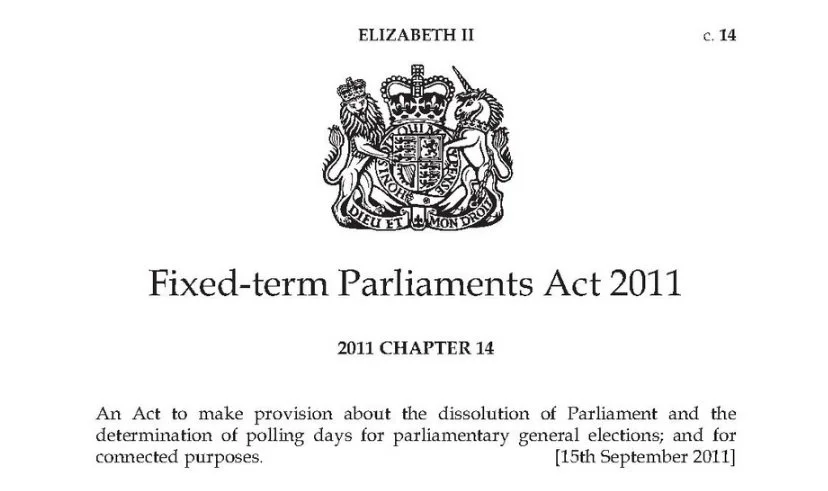Fixed-Term Parliaments Act, time for reform?
The Fixed-term Parliaments Act’s days are numbered, with a Government backed repeal and replace Bill having recently completed its first reading.[1] This article seeks to assess the FTPA’s ‘central aim’[2] of preventing the sitting Government from calling a snap election, concluding that the Act is ineffective in this role.
The FTPA provides for a ‘semi-fixed’ Parliament,[3] wherein an early dissolution can occur only when a motion to trigger an early election has the support of two-thirds of the House of Commons (s2(2)), or following a vote of no confidence where no other Government can be formed (s2(3)). The overall effect of the aforementioned provisions, in principle, is to ‘remove’[4] the prerogative power of dissolution, which by convention has been used on the advice of the sitting Prime Minister.
In practice, the FTPA has proven ineffective at preventing a dissolution and subsequent snap election when sought by the Government, failing at a core aim. Prior to the implementation of the FTPA, Blackburn recognised that a hypothetical duty to seek Parliamentary consent to call an early election would have little practical impact, given that the Opposition will always be ‘under pressure’[5] to support an early election- effectively making Parliamentary approval a rubber stamp. This was seen in the 2017 invocation of s2(2), where opposition parties overwhelmingly backed the early election motion despite being behind in opinion polls. Furthermore, the two-thirds statutory requirement can be circumvented by a simple majority passing an Act providing for an early election, as predicted by Craig and demonstrated in 2019.[6] Given that, by convention, the Government commands a majority in the Commons, there are few scenarios where the FTPA prevents a government from calling an election.
The sovereignty of Parliament, whereby Parliament can ‘alter any law’[7] including the FTPA; the convention that the government must command a majority in the Commons; and Opposition pressure to support an early election have rendered the FTPA ineffective in preventing government initiated snap elections. Having been included in the Conservative party manifesto at the most recent election, and passed a first reading, it is highly likely that the statutory regime for dissolution set up by the FTPA will be dismantled. Whilst the law itself has proven to be circumventable, legal issues surrounding dissolution will not end with its repeal. In particular, with a potential return to the Royal prerogative governing dissolution, questions have been raised as to whether there are any scenarios where Her Majesty the Queen could deny a Prime Minister’s request for a dissolution.
[1] Dissolution and Calling of Parliament Bill
[2] R Craig ‘Restoring confidence: Replacing the Fixed-term Parliaments Act 2011’ MLR 2018, 81(3), 480-508
[3] Lord Norton of Louth, Hansard, HL Deb Vol. 726, col. 563, March 21, 2011
[4] M Ryan ‘The Fixed-term Parliaments Act 2011’ PL 2012, Apr, 213-221
[5] R Blackburn ‘The prerogative power of dissolution of Parliament: law, practice, and reform’ PL 2009, Oct, 766-789
[6] Early Parliamentary General Election Act 2019
[7] AV Dicey ‘Introduction to the Study of the Law of the Constitution’ (8th edn, London, Macmillan , 1915) 39



